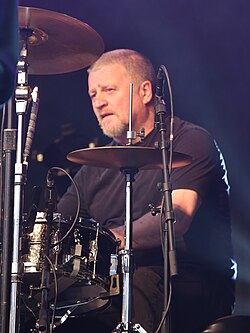1968
(Brethren) | 1968–1973 | 1973–1975 | 1975–1976 |
|---|
| - Ray Jackson – vocals, mandolin, harmonica
- Simon Cowe – guitar, mandolin, banjo, backing vocals
- Rod Clements – bass guitar, violin, keyboards, guitar, backing vocals
- Ray Laidlaw – drums
- Alan Hull – vocals, guitar, keyboards
| - Ray Jackson – vocals, mandolin, harmonica
- Alan Hull – vocals, guitar, keyboards
- Kenny Craddock – keyboards, guitar, backing vocals
- Tommy Duffy – bass guitar, backing vocals
- Charlie Harcourt – guitar
- Paul Nichols – drums
| Disbanded |
| 1976 | 1976–1978 | 1978–1984 | 1984–1990 |
|---|
- Ray Jackson – vocals, mandolin, harmonica
- Alan Hull – vocals, guitar, keyboards
- Rod Clements – bass guitar, violin, backing vocals
- Simon Cowe – guitar, mandolin, banjo, keyboards, backing vocals
- Ray Laidlaw – drums
| Disbanded | - Ray Jackson – vocals, mandolin, harmonica
- Alan Hull – vocals, guitar, keyboards
- Rod Clements – bass guitar, violin, guitar, backing vocals
- Simon Cowe – guitar, mandolin, banjo, keyboards, backing vocals
- Ray Laidlaw – drums
| - Ray Jackson – vocals, mandolin, harmonica
- Alan Hull – vocals, guitar, keyboards
- Rod Clements – bass guitar, violin, guitar, backing vocals
- Simon Cowe – guitar, mandolin, banjo, keyboards, backing vocals
- Ray Laidlaw – drums
- Marty Craggs – saxophone, flute, vocals
- Touring personnel
- Steve Daggett – keyboards (1986–1987)
|
| 1990–1994 | 1994 | 1994–1995 | 1995–2000 |
|---|
- Alan Hull – vocals, guitar, keyboards
- Rod Clements – slide guitar, mandolin, guitar
- Ray Jackson – vocals, mandolin, harmonica, backing vocals, additional bass
- Simon Cowe – guitar, mandolin, banjo, keyboards, backing vocals
- Ray Laidlaw – drums
- Marty Craggs – tenor & alto saxes, accordion, tin whistle, vocals
- Steve Cunningham – bass guitar, recording engineer, producer
| - Alan Hull – vocals, guitar, keyboards
- Rod Clements – slide guitar, mandolin, guitar, backing vocals
- Simon Cowe – guitar, mandolin, banjo, keyboards, backing vocals
- Ray Laidlaw – drums
- Marty Craggs – tenor & alto saxes, accordion, tin whistle, vocals
- Ian Thomson – bass guitar, backing vocals
| - Alan Hull – vocals, guitar, keyboards
- Rod Clements – slide guitar, mandolin, guitar, violin, backing vocals
- Ray Laidlaw – drums
- Marty Craggs – tenor & alto saxes, accordion, tin whistle, vocals
- Ian Thomson – bass guitar, backing vocals
- Dave Hull-Denholm – guitar, keyboards, vocals
| - Rod Clements – slide guitar, mandolin, guitar, violin, backing vocals
- Ray Laidlaw – drums
- Marty Craggs – tenor & alto saxes, accordion, tin whistle, vocals
- Ian Thomson – bass guitar, backing vocals
- Dave Hull-Denholm – guitar, keyboards, vocals
- Billy Mitchell – vocals, guitar, mandolin, banjo, keyboards
|
| 2000–2003 | 2003–2004
(Lindisfarne Acoustic) | 2004–2013 | 2013–2014 [23] [24] |
|---|
- Rod Clements – slide guitar, mandolin, guitar, violin, backing vocals
- Ray Laidlaw – drums
- Ian Thomson – bass guitar, backing vocals
- Dave Hull-Denholm – guitar, keyboards, vocals
- Billy Mitchell – vocals, guitar, mandolin, banjo, keyboards
| - Rod Clements – slide guitar, mandolin, guitar, backing vocals
- Dave Hull-Denholm – guitar, keyboards, vocals
- Billy Mitchell – vocals, guitar, mandolin, banjo, keyboards
| Disbanded | - Dave Hull-Denholm – vocals, guitar, keyboards
- Ray Jackson – vocals, mandolin, harmonica
- Steve Daggett – vocals, keyboards, acoustic guitar
- Charlie Harcourt – guitar, backing vocals
- Paul Thompson – drums
- Ian Thomson – bass guitar, backing vocals
- Tom Leary – violin
|
| 2015 [25] | 2015–2018 [25] [26] | 2018–2021 [26] | 2021–2025 [14] [27] |
|---|
- Dave Hull-Denholm – vocals, guitar, keyboards
- Steve Daggett – vocals, keyboards, acoustic guitar, harmonica
- Charlie Harcourt – guitar
- Paul Thompson – drums
- Ian Thomson – bass guitar
- Tom Leary – violin
- Rod Clements – vocals, slide guitar, guitar, mandolin
| - Dave Hull-Denholm – vocals, guitar, keyboards
- Steve Daggett – vocals, keyboards, acoustic guitar, harmonica
- Charlie Harcourt – guitar
- Paul Thompson – drums
- Ian Thomson – bass guitar
- Rod Clements – vocals, slide guitar, guitar, mandolin, violin
| - Dave Hull-Denholm – vocals, guitar, keyboards
- Steve Daggett – vocals, keyboards, acoustic guitar, harmonica
- Paul Thompson – drums
- Ian Thomson – bass guitar
- Rod Clements – vocals, slide guitar, guitar, mandolin, violin
| - Dave Hull-Denholm – vocals, guitar, keyboards
- Steve Daggett – vocals, keyboards, acoustic guitar, harmonica
- Ian Thomson – bass guitar
- Rod Clements – vocals, slide guitar, guitar, mandolin, violin
- Paul Smith – drums
|
| 2025–present |
|---|
- Dave Hull-Denholm – vocals, guitar, keyboards
- Steve Daggett – vocals, keyboards, acoustic guitar, harmonica
- Rod Clements – vocals, slide guitar, guitar, mandolin, violin
- Paul Smith – drums
|












